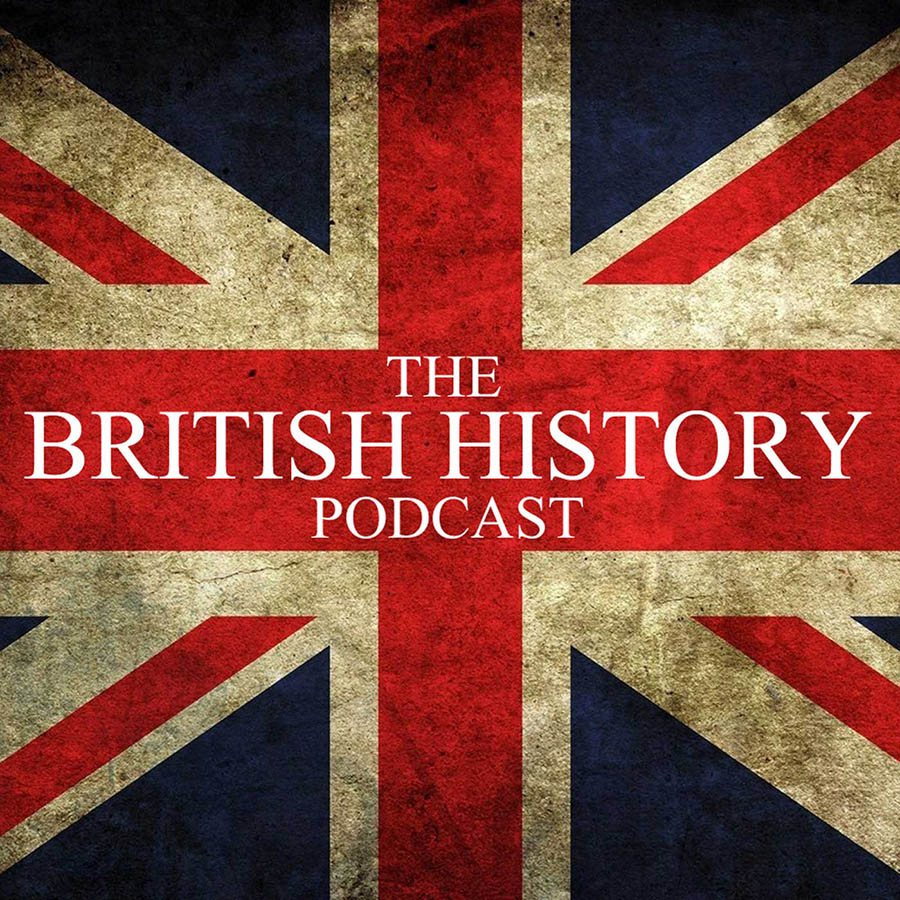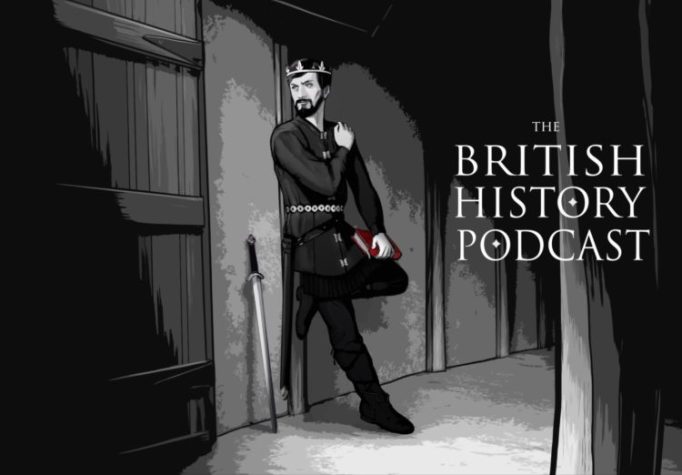Think you hate history? You’re probably wrong, says Jamie Jeffers, founder of The British History Podcast.
The problem, he says, isn’t that history is dry or boring — the problem is that it is taught that way, with rote memorization and little relevance to the modern world.
“People are people,” Jeffers says. The stories of history, even ancient history, “are relevant and compelling on their own. They are only made irrelevant by poor storytellers who forget that simple truth — that history is the story of humanity. It’s about all of us.”
With his podcast, which has been in production for almost a decade and has cultivated a loyal fan base over hundreds of episodes, Jeffers tells the stories of British history by tapping into that humanity. In his chronological retelling, you won’t hear lists of names, treaties, and battles, but rather tales of the cultural underpinnings behind the actions of kings and the day-to-day lives of the people of Britain.
In Jeffer’s words, it was a happy convergence of “transatlantic immigration, global financial collapse, and ancient human traditions” that took him from unemployed lawyer to full-time podcaster creating the ultimate passion project, one that draws on his own personal history, builds his future, and connects us all to the past.
Related: Step-by-Step Guide: How to Start a Podcast With WordPress
History Through Storytelling
It’s all his grandfather’s fault, Jeffers says.
Jeffers, who moved to the US from the UK when he was a kid, learned the history of his homeland from his grandfather, who wanted to make sure young Jeffers heard stories of his ancestors alongside his American education.
“He took it upon himself to teach me what he knew about British History as I was growing up,” Jeffers says. “He was an amazing storyteller, and so my first experience with history was through hearing about amazing events and figures. It was learning history as people traditionally taught it, as an oral history.”
His grandfather’s storytelling taught Jeffers to love history — at least until he actually studied the subject in school.
“I went to high school, and history was suddenly reduced to memorizing dates and names for a test,” Jeffers says. “No context, no nuance, no wonder at our shared past. It was such a disappointing experience that I lost interest in the study of history.”
Eventually, Jeffers went on to study English in college and then become a lawyer. For the most part, Jeffers tabled his interest in history — that is, until the recession forced it back into his life.
Global Financial Collapse
The 2008 financial crisis wasn’t kind to most people — Jeffers included. As money got tight, he looked around for cheap sources of entertainment, leading him straight into the world of podcasting.
“The first show I found was The Memory Palace, which is still going, and it became a regular companion when I was at the gym or taking my dog, Kerouac, for a walk. The host, Nate DiMeo, couldn’t have known it, but the way he talked about little odd stories from history made me feel like I was reconnecting with part of my childhood.”
But a search for podcasts about British history was disappointing, to say the least. It brought him to a “show that was done by a guy who seemed to be reading random entries off Wikipedia. Incorrect entries, for that matter.” Back in those pre-Serial days, podcasting was a new thing — it was “pretty punk rock,” he says. “Few people knew about it, and even fewer people did it, which meant that many topics weren’t being covered and those that were weren’t being covered well. Quality was definitely a problem.”
Jeffers did find a history show or two but occasionally found himself wishing for a good podcast that took on a chronological history of Britain.
Then one day the financial collapse hit closer to home, and Jeffers lost his job as an attorney.
“The part that people rarely talk about with unemployment is how boring it is,” he says. “So I decided that any time that I wasn’t job searching would go towards making that show I always wanted.”
The podcast launched with its first season in May 2011, beginning with the Ice Age and prehistoric Britannia and moving into the Roman conquest of Britain. At first, Jeffers’ vision was nothing more than a fun hobby that only his parents would listen to.
“Eight years later, it’s my life’s work,” Jeffers says. “Oh, and my parents still don’t listen to it. But a lot of other people do.”
Today, the podcast boasts more than 3,000 reviews on iTunes and shows up on lists such as recommended podcasts for fans of Serial and Parade’s list of top history podcasts.
Beyond the Battle

Search your favorite podcasting app these days, and you’ll find history shows aplenty.
But the British History Podcast (BHP) isn’t your run-of-the-mill history podcast, Jeffers says. “Many history podcasts are dry accounts that only perk up when they can talk about men swinging swords. They skip over the culture of the time, other than as it pertains to kings and generals, and then give you incredibly granular details of men killing other men in battle.”
What interests Jeffers (and his audience) are the stories behind the conflicts. To truly understand and care about an action-packed battle, audiences need to appreciate the stakes. “There’s a reason why The Phantom Menace sucked, and it wasn’t the fight choreography,” he says. “Context is king, and that’s where our focus is.”
That’s why the BHP discusses at length through the political, social, and cultural realities that drive the “action scenes” of history. Another way the show’s different: “We talk about women. It’s strange how often they’re written out.”
Jeffers cites one of his favorite little-known figures from history: Lady Æthelflaed of Mercia, who reigned in an era when women we so overlooked, even vilified, that there weren’t any queens — just women known as “the king’s wife.”
“And then you have the noble daughter of Alfred the Great, a woman named Æthelflaed, who ruled Mercia on her own after her husband died. She led armies. She fought off a massive force of Vikings at Chester by throwing everything, up to and including the town’s beehives, at them. This woman was so influential that after she died, even though the culture was deeply misogynistic, the Mercians chose to follow her daughter.”
Jeffers’ favorite era of British history is the Middle Ages — “which I’m sure most of our listeners already know since we’ve spent about seven years in them so far.” The BHP is currently detailing the reign of King Æthelred Unræd (aka King Ethelred the Unready), who is often blamed for the downfall of the Anglo Saxons — “though I think there’s plenty of blame to go around.” Jeffers is most looking forward to covering the 15th-century Wars of the Roses, a series of English civil wars: “the diaries we have out of that era are stunning and show the real human toll that this conflict was taking on the population.”
The planned finish line is the dawn of WWII, which could take another decade to reach. Until then, Jeffers is dedicated to dissecting and retelling as many stories and cultural tidbits as he finds relevant — a quest that fits nicely in the podcasting sphere.
“Can you imagine The History Channel allowing me to do over 300 episodes of British History and spend literally hours just talking about how food was handled in the middle ages? Part of what makes podcasting so amazing is that it allows for niche shows like the BHP to exist.”
Behind the Scenes
Jeffers is quick to remind his audience that he isn’t a professional historian, though his “magpie approach to education” serves him well as a “history communicator.”
“My educational background has a common throughline of narrative building and research,” Jeffers says. “I studied storytelling in college, getting a degree in creative writing while also spending a lot of time taking courses in subjects like critical and cultural theory. As for law, my focus was as a litigator. What many people don’t realize about litigators is that a lot of what you do is tell stories to the judge or jury. You do a lot of deep research and then turn it into an easy to digest narrative for why your side should win. Turns out that these skills serve very well for teaching history — especially little-known history.”
Each 25- to 40-minute episode takes about 40 to 50 hours to produce. As for structuring the stories, Jeffers rarely finds a clear “pop history narrative” to build around because the history of medieval Britain he aims to create simply doesn’t exist elsewhere. Instead, he digs through secondary sources, fact checks primary sources, scans and fact checks scholarly articles for alternative theories, and then looks into “any rabbit holes that pop up during the research.”
The lengthy editing process is a collaboration between Jeffers and his partner and co-producer Meagan Zurn — or Zee, as she prefers. “Then I finally record the episode, do sound editing, and launch. It’s quite a process.”
There’s no way Jeffers could juggle a full-time job with all of the research and planning involved. But thanks to a dedicated community of listeners, the podcast moved from passion project to day job. He doesn’t even need to run ads — it’s funded entirely through donations and a membership, which grants paying listeners access to exclusive content.
“I’ve really lucked out in the community that has developed around the podcast,” Jeffers says. In fact, he says his favorite part of producing the podcast is connecting and collaborating with the community. “They’re really supportive and enthusiastic people.”
The British History Podcast official web page, complete with membership content and a full archive of eight years worth of podcasting, is proudly hosted by DreamHost. Like the podcast itself, the website has been a DIY project: “When you’re a small project like this, anything you can do yourself, you do.”
The site uses DreamPress Pro with Cloudflare Plus, “which has allowed us to have a rather stable user experience even during high load times like on launch days,” Jeffers says. “The tech support team has been really helpful in finding solutions to some of the more thorny problems of running a podcast site with a membership component.”

Do What You Love with DreamPress
DreamPress’ automatic updates and strong security defenses take server management off your hands so you can focus on creating great content.
Check Out PlansA Romance for the Ages
Jeffers says he’s met some incredible people through the podcast community, including his producer — and now wife — Zee.

Back in the early days of the BHP, Jeffers used an “old clunky Frankenstein computer that kept breaking down. I had a hard drive crash, a power supply short, a motherboard fry. I swear that damn computer had gremlins, and as a result, I repeatedly had to go on our community page and apologize for episodes getting delayed.” The community ganged up and insisted his problems stemmed from using a PC — all except one person, who stood her ground against the Mac fans.
“I believe her exact phrase was, ‘You’re all caught up in a marketing gimmick,’” Jeffers says. A few months later, when he had an idea for a side project and wanted honest feedback, he remembered this listener’s well-researched uncompromising arguments.
“And half a world away, in Southern England, Zee got a message out of the blue,” Jeffers says. “It ended up being the smartest thing I’ve ever done. The person I reached out to was a Ph.D. candidate in sociology and media with a background in anthropology and archaeology. She understood on an intrinsic level the ethics of the show, the long-term strategy, the purpose of it, and what it could be going forward.”
And just like that, Jeffers had a collaborator: “One day, I was doing the show entirely on my own; the next day I was running all my ideas by her, and I structured my life so that I could work with her.” They discussed the show daily; Zee reviewed Jeffers’ scripts and prompted heated debates over the content. “And through that, the show dramatically improved in tone and style. She also became my best friend. Truth be told, I think she was my best friend from the first time we talked.”
“Much later, we met in person, and it was clear my ferociously intelligent best friend was also really attractive. Eventually, we started dating. Then she proposed to me one Christmas morning, and now we’re expecting our son this July.”
By the way, Jeffers still uses a PC.
Looking Forward
Overall, creating the podcast has been a rewarding creative outlet for both Jeffers and Zee — but the work can be draining. “It’s very satisfying but very intensive work to hit the quality we demand of ourselves.”
For now, outside the show, his and Zee’s primary focus is preparing for parenthood. The podcast is likewise approaching a monumental milestone: the Norman Conquest of 1066.
“This invasion changed everything, and it’s going to usher in a whole new era of the podcast as well,” Jeffers says. “We have a whole new culture to talk about, along with larger-than-life characters to introduce. The story is about to get a whole lot bigger.”
What’s your next great idea? Tell the world (wide web) about it with DreamHost’s Managed WordPress Hosting, built to bring your dream to life without breaking the bank — or making any compromises in quality.
